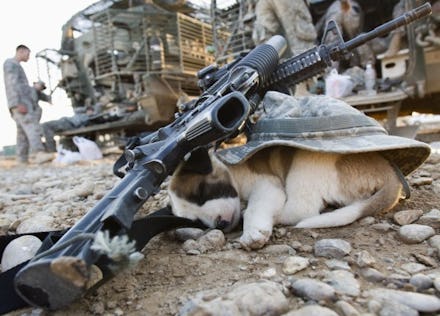Animals Suffer as Much as Humans During Wars. Here's Why.

I had never heard of an animal's suicide before the suicidal baby giraffe in the Egyptian press last week. Veterinarians claim that a 3-year-old giraffe choked itself to death on the metal shade structure of the zoo where it was subjected to aggression from visitors, and where animals reportedly suffer from untreated diseases and severe starvation. Despite the report, many question whether animals are capable of committing suicide, or if they are perishing in ways that resemble it. Whatever the answer, the question leads one to reflect on the nature of human suffering and whether animals experience stress and pain as humans do.
Emir Kusturica's film Underground depicts the history of Yugoslavia from World War II through the Yugoslav Wars of the '90s. It addresses this this very question. As the Germans pummeled Belgrade with bombs, the zoo was destroyed, thus killing a mother monkey, who left her baby alone in despair.
During times of conflict, the suffering of animals is often overlooked as the world focuses on human casualties. But animal rights are often overlooked during times of peace as well. Upon visiting the disputed territory Abkhazia last month, home of what has been dubbed a frozen conflict, I saw a monkey "sanctuary" that dates back to Soviet times. Hundreds of monkeys waste away in the sanctuary's cages. But when I looked into the nervous eyes of these desperate creatures, I was struck by their humanity. I couldn't help but wonder how dignified and rational my fellow humans and I would appear were we to live in similar surroundings.
Image Credit: Russian History Blog
During times of war, animals are either neglected or used as commodities to facilitate the war effort. Historically, horses, dogs, donkeys, cats, and pigeons have been used to carry soldiers, sniff out bombs, and bring messages across the warzone. Around 8 million horses and donkeys died in World War I. In a rare show of appreciation, the United Kingdom created the Dickin Medal to award those animals that served in World War II.
Perhaps the most interesting recipient of this award was Simon the cat, who killed the entire rat population of a British naval ship after surviving a canon blast that killed many of the ship's human inhabitants.
Despite technological advances, animal participation is still common in modern day warfare. And more recently, in the Iraq war, bottlenose dolphins were used to find underwater mines, and often got slaughtered by enemy forces in the process.
Humans often assume that because animals cannot explicitly reason with us in our own language, they are lesser beings. This is how we convince ourselves that it is permissible to rob them of their milk after pregnancy, utilize them for our entertainment, torture them in the name of science, or raise them for slaughter in deplorable conditions.
But every now and then, a story surfaces that demonstrates how non-homosapiens react to strife. Consider the heartbreaking story of a mother cow who, remembering the pain of having her calves taken from her after previous pregnancies, successfully hid that she had given birth to twins in order to provide just one of her offspring with milk. Stories like this give credence to the idea that animals are conscious of their own existence, are able to demonstrate preferences for phenomenon that make them happy, exercise foresight, and strive for a better quality of life.
More importantly, they demonstrate that animals can feel emotional bonds comparable to the way humans experience love. I doubt that any proud dog "owner" would dispute this.
These stories also imply that like humans, animals are conscious subjects that deserve equal rights. Humans have resorted to enshrining their rights in the law with the expectation that people will respect them. But how can animals protect their rights? Is it the responsibility of human activists to protect these beings from the pain inflicted on them by members of our own species?
Some Christian philosophers, such as Saint Augustine, have claimed animals are unable to think and were put on the earth to serve humans. These beliefs have seeped into our modern day consciousness and account for why we are less empathetic towards animals than we are towards humans.
We should protect both human and animal rights during times of peace and conflict.